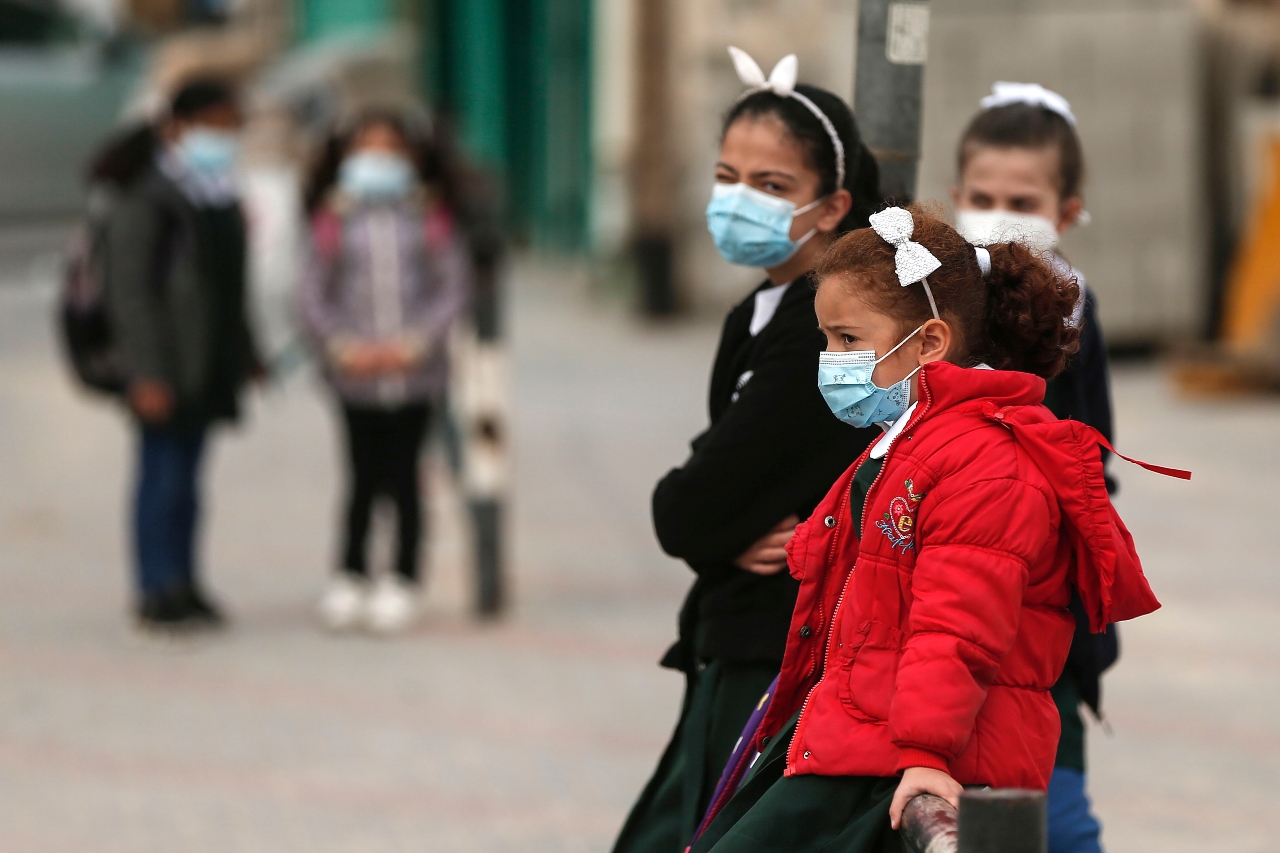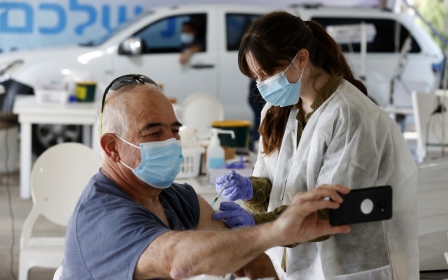Covid-19: Palestinians still awaiting vaccines as Israel dismisses calls to provide jabs

As countries around the world begin to roll out the Covid-19 vaccine to their populations, millions of Palestinians living in the West Bank and Gaza still have no clear answers on when they can expect to see the vaccine come to their towns and cities.
For months, Palestinian Authority (PA) officials have worked to secure vaccines, setting a number of deadlines for their arrival, but none of those deadlines have so far materialised.
Palestinian Ministry of Health (MoH) officials have reported working with the World Health Organisation (WHO), in addition to private companies, to secure as many doses as they can, though it still remains unclear just which vaccines will be made available to the public.
On Monday, Palestinian Minister of Health Mai al-Kaila announced that the MoH had approved the Russin Sputnik V vaccine for “emergency use” in Palestine, making it the first country in the Middle East to register the vaccine.
According to Kaila, the Russian company supplying Sputnik V is one of four companies contracted by the MoH to supply vaccines to Palestinians in the occupied territories.
Kaila added that it would be distributed “as soon as it arrives”, first to health workers, then the sick and the elderly, “until about 70 percent of Palestinians in the West Bank and Gaza Strip are vaccinated”.
Lack of planning
MoH spokesperson Kamal al-Shakhra told Voice of Palestine radio over the weekend that the MoH also “received a formal letter from the AstraZeneca pharmaceutical company that by 15 February, the vaccines will arrive in Palestine... between the middle and the end of the month”.
The vague nature of statements from Palestinian health officials regarding everything from when the vaccines can be expected to arrive to how they are going to be distributed has pervaded the government’s overall response to the Covid-19 vaccine rollout.
While PA officials have made statements on who will be given priority when it comes to the vaccine, they have yet to put forward a comprehensive strategy for rolling it out.
The lack of planning begs the question of how efficiently the government, given their lack of resources and struggling health infrastructure, will be able to properly innoculate the population amid the rising cases of Covid-19.
MoH officials declined multiple requests from MEE to speak about the government’s rollout plan, and when asked about when Palestinians can expect to get vaccinated, a ministry official pointing to previous statements made by Kaila to the government news agency, Wafa.
Israel’s obligation under international law
Meanwhile, Israel has been praised for what has been called an “exceptional” campaign to innoculate its citizens.
Recently, the country has become one of the first in the world to vaccinate 20 percent of its population of nine million people with the first jab of the two-dose vaccine - a vaccination rate around 10 times that of countries like the US and UK.
But as Israeli leaders make plans to release the country’s data as a "global model" for rapid vaccination, Palestinian officials and rights groups have condemned it for leaving millions of Palestinians living under its control without any access to vaccines.
“The search by the Palestinian leadership to secure the vaccines from various sources does not exempt Israel from its duties towards the Palestinian people in providing the vaccines,” the Palestinian foreign ministry said in a statement.
In a letter signed by 20 Palestinian and Israeli human rights groups, the organisations demanded Israel provide vaccines to Palestinians living under occupation, citing Article 56 of the Fourth Geneva Convention, which “specifies that an occupier must ensure 'the adoption and application of the prophylactic and preventive measures necessary to combat the spread of contagious diseases and epidemics'.”
This duty, according to the organisations, “includes providing support for the purchase and distribution of vaccines to the Palestinian population under its control”.
WHO request dismissed
Suhad Bishara, a lawyer with Adalah, The Legal Centre for Arab Minority Rights in Israel, told MEE: “We are talking about an area that remains under occupation where almost everything is under Israeli control.
"Israel has a very clear obligation to support the supply of vaccines to every Palestinian living under occupation - whether in Gaza, East Jerusalem, or Areas A, B and C of the West Bank.
“Unfortunately it doesn't seem that Israel is doing anything towards guaranteeing vaccination to all those Palestinians under occupation.”
- Suhad Bishara, lawyer with Adalah
“Unfortunately it doesn't seem that Israel is doing anything towards guaranteeing vaccination to all those Palestinians under occupation.”
Bishara said that Israel “should be coordinating with the Palestinians to formulate a tight and clear timeline of distribution for all communities in the occupied territories,” but that “as far as we know, no such policy is being formulated”.
While Palestinian officials have denied explicitly asking for Israel to provide them with vaccines, the WHO reported that Israeli officials “dismissed” a request made by the organisation in “informal discussions” to provide vaccines for Palestinian frontline healthcare workers, due to what Israeli officials claimed were “vaccine shortages” in their country.
'Responsibilities as the occupier'
Last month, Israel’s Public Security Minister publicly defied a directive from the Israeli Ministry of Health by deciding against vaccinating Palestinian security prisoners, thousands of whom are jailed in crowded Israeli prisons with little to no protection against the virus.
“The refusal to vaccinate Palestinian political prisoners is just another aspect of the failure of the Israeli authorities to uphold their responsibilities as the occupier,” Bishara told MEE.
“There needs to be an international call to hold Israel responsible and obligate it to allocate vaccines to the Palestinians in the occupied territories, and to obligate it to fulfill its duties under international law.
“We are talking about a situation that threatens the life and health of everyone in Palestine.
"If Israel does not fulfill its duty, this community will remain under increased risk of the virus, which we’ve seen spread rapidly in the West Bank and Gaza in recent weeks.”
Devastated health infrastructure
Though the prospect of Israel providing vaccines to the Palestinian population it occupies remains slim, critics have pointed to the fact that even if Israel were to provide doses of the Pfizer vaccine, the PA does not have the capacity to store the vaccine at the required sub-zero temperatures.
Others have highlighted that when it comes to securing the vaccine, the PA is relying heavily on the help of global alliances such as COVAX - an initiative launched in April by the WHO, the European Commission and France in response to the pandemic - which still has not received the necessary approvals to begin distributing vaccines.
Meanwhile, Bishara said decades of Israeli occupation have devastated the PA’s health infrastructure, making it hard for the government to contain and treat the virus.
“Over 50 years of occupation has been devastating for the Palestinians in the West Bank and Gaza, on all levels,” Bishara told MEE.
“It affects their lives in all aspects, whether that is health, education, infrastructure, their social life, work and every other aspect of day to day living.
“The PA in many aspects is dependent on Israel, and as a result of Israeli policies it hasn't been able to bring its health system to a situation where it can function as an independent and progressive system.
She added: “Israel must abide by its obligations given the life and death circumstances of the pandemic.”
Middle East Eye delivers independent and unrivalled coverage and analysis of the Middle East, North Africa and beyond. To learn more about republishing this content and the associated fees, please fill out this form. More about MEE can be found here.






